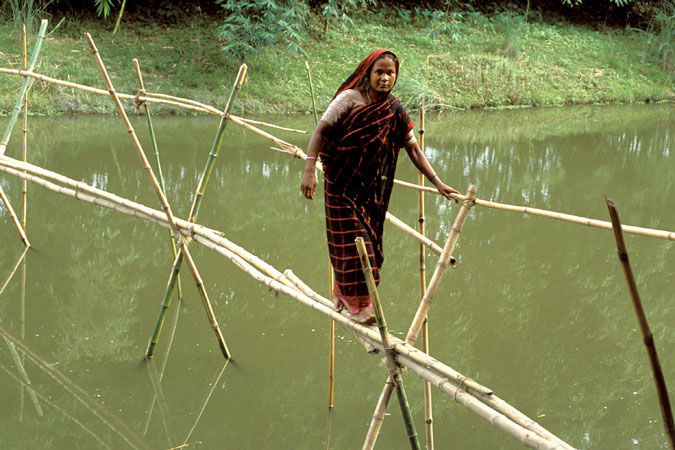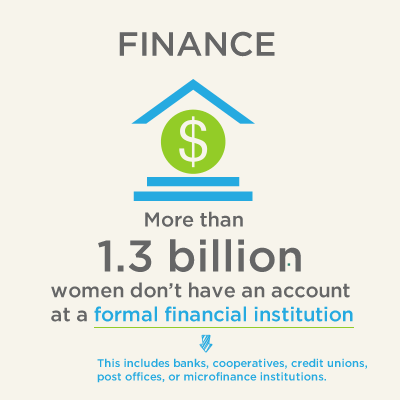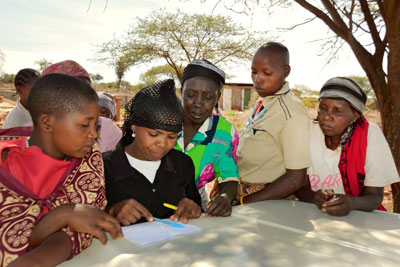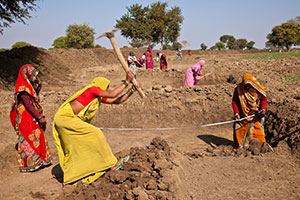SDG 1: End poverty in all its forms everywhere

Targets
- By 2030, ensure that all men and women, in particular the poor and the vulnerable, have equal rights to economic resources, as well as access to basic services, ownership and control over land and other forms of 13 property, inheritance, natural resources, appropriate new technology and financial services, including microfinance.
- Create sound policy frameworks at the national, regional and international levels, based on pro-poor and gender-sensitive development strategies, to support accelerated investment in poverty eradication actions.
- By 2030, eradicate extreme poverty for all people everywhere, currently measured as people living on less than USD 1.25 a day.
- By 2030, reduce at least by half the proportion of men, women and children of all ages living in poverty in all its dimensions according to national definitions.
- Implement nationally appropriate social protection systems and measures for all, including floors, and by 2030 achieve substantial coverage of the poor and the vulnerable.
- By 2030, build the resilience of the poor and those in vulnerable situations and reduce their exposure and vulnerability to climate-related extreme events and other economic, social and environmental shocks and disasters.
- Ensure significant mobilization of resources from a variety of sources, including through enhanced development cooperation, in order to provide adequate and predictable means for developing countries, in particular least developed countries, to implement programmes and policies to end poverty in all its dimensions.
The end of poverty can only be achieved with the end of gender-based discrimination. All over the world, gender inequality makes and keeps women poor, depriving them of basic rights and opportunities for well-being.
Women make significant contributions every day from bringing an income to her household as an employed wage earner, to creating jobs as an entrepreneur, to taking care of her family and elders. However, a woman farmer, for instance, may not be able to make her crops thrive like a man can because she doesn’t have the same access to seeds, credit, technology and extension services [1]. She is very unlikely to own her land—only 20 per cent of landowners globally are women [2]. If she hopes to someday inherit family property, the law may deprive her of an equal share, or social convention may simply favour her male relatives.

Poverty comes with many risks; discrimination leaves women less resilient to these. In an economic downturn, poor women are less likely to have savings and abilities to make up for lost income. Poor girls are more than twice as likely to marry in childhood as those who are wealthy [3]. They then face potentially life-threatening risks from early pregnancy, and often lost hopes for an education and a better income.
Women have a right to equal access to all avenues to end poverty, from social protection safety nets to use of the latest technology. Fully realizing that right will be key to achieving the first SDG.
UN Women acts to end poverty through programmes to provide training, loans and practical skills to empower poor women economically, give them a voice, strengthen social services and increase awareness of women’s rights. We also work to ensure women’s access to basic services, control over land and other forms of property, inheritance, natural resources, appropriate new technology and financial services.
Stories
Income empowers Kilimanjaro women to seek justice
Through a programme supported by UN Women’s Fund for Gender Equality, more than 1,000 poor women in the United Republic of Tanzania have joined savings and loans groups, started businesses, and sought legal advice to claim their rights.
Changing the landscape with all-women worksites in India
UN Women interventions have reached more than 100,000 poor and marginalized women in 29 districts in India. Through a project supported by UN Women’s Fund for Gender Equality, more than 30,000 rural women now manage worksites and are able to ensure wages are paid and demand their rights under pension, social protection and livelihood programmes.
Notes
[1] Food and Agriculture Organization (2011), The State of Food and Agriculture 2010-2011: Women and Agriculture, Closing the Gender Gap for Development.
[2] Ibid.
[3] UNICEF (2013), Ending Child Marriage: Progress and prospects, p. 2.

